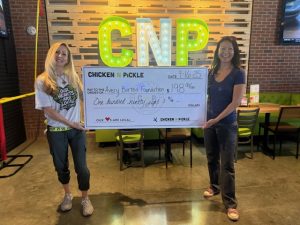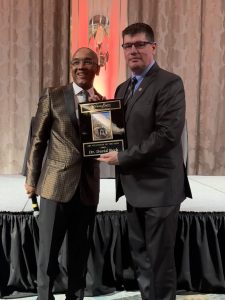The ABF Resiliency Project was created to empower people to use their voice and share stories of resilience while coping with adversity that life throws our way. From time to time, we will share these stories as a way to create conversations that help with our goal of ending the stigma around depression. If you would like to suggest someone for a profile, contact us by filling our our contact form.
Please meet David Beck, who recently moved from Arizona to Southern Nevada in search of new job opportunities and cancer treatments.
David Beck is a passionate Avery Burton Foundation (ABF) supporter whose personal battles with cancer, depression, and survival of multiple suicide attempts have fueled his commitment to breaking the stigma around mental health. Deeply aligned with the mission of ABF, David believes in the power of empathy, education, and resilience to create lasting change in communities. As a volunteer and supporter, he strives to normalize conversations about mental health and expand access to resources for individuals and families in Nevada, regardless of their socioeconomic status. David’s values shine through in his efforts to inspire others to seek help and foster a culture of acceptance. He envisions a future where mental health is prioritized alongside physical health, with robust support systems integrated into schools, workplaces, and community spaces. We caught up with David to ask him about his thoughts on mental health and wellness.
1) What inspired you to get involved with the Avery Burton Foundation, and what about their work stands out to you?
Having struggled with depression throughout my life and survived multiple suicide attempts, I deeply understand the importance of mental health advocacy. The Avery Burton Foundation’s mission to destigmatize mental health and provide support resonates strongly with me. Their focus on fostering education and awareness in the community is not only impactful but also deeply personal, as I know firsthand how critical these efforts are. Their work stands out because it is rooted in empathy and action, reaching out to teens, adults, and families at a grassroots level. The Foundation doesn’t just talk about change; it actively works to create a supportive environment where individuals can find hope and healing. I believe their approach of combining awareness with education and community engagement is what makes their efforts so impactful. Supporting an organization with such a personal and meaningful mission feels like an extension of my own commitment to giving back. Together, we can help ensure that no one feels alone in their struggles.
2) How does supporting mental health initiatives align with your own values?
Supporting mental health initiatives aligns perfectly with my values of resilience, advocacy, and education. I believe in the power of compassion, understanding, and education to create lasting change. Supporting mental health initiatives aligns with my belief that every individual deserves access to resources and support. Volunteering with the Avery Burton Foundation allows me to give back and help others realize they are not alone in their struggles. It also gives me the chance to inspire others to see that their struggles do not define them, and that with the right support, recovery is possible. Mental health issues are often misunderstood or overlooked, and I feel a personal responsibility to use my experiences to advocate for those who might not yet feel strong enough to speak up for themselves.
3) What impact do you hope your support of the Avery Burton Foundation will have on the Southern Nevada community?
Through my support of the Avery Burton Foundation, I hope to help normalize conversations about mental health in Southern Nevada and beyond. Breaking the stigma that surrounds mental health is essential to encouraging individuals and families to seek help without fear or judgment. By raising awareness and promoting education, I aim to contribute to a community where mental health resources are as accessible and valued as any other healthcare services, and no one feels isolated in their struggles. I hope our efforts will inspire others to become advocates for change, creating a ripple effect of understanding and compassion.
4) How do you think initiatives like the recent ‘My Cause, My Cleats Campaign’ from the NFL and the ‘Mental Health Matters’ news series from News 3 foster dialogue about mental health in families and communities?
These initiatives are crucial in breaking the stigma surrounding mental health, especially when high-profile, millionaire athletes open themselves up and share their reasoning for supporting causes such as the ABF – for many of them it is personal. When high-profile organizations, like the NFL and NHL, and media outlets openly address mental health, it sends a powerful message that mental well-being is just as important as physical health. These campaigns create opportunities for people to have conversations that might not otherwise happen. They show families and communities that seeking help is a sign of strength, not weakness, and that it’s okay to talk about mental health challenges. They give people the courage they may have been searching for to take the first step to reaching out for the help they have delayed in seeking out. Furthermore, these initiatives create a ripple effect, inspiring other organizations to join the conversation and amplify the message. The result is a growing culture of acceptance and understanding that helps break down barriers for those struggling with mental health issues.
5) What lasting change would you like to see in the way mental health is addressed and supported within Nevada’s communities?
I envision a future where mental health resources are as accessible and readily available as physical health services. This includes robust funding for education, prevention, and treatment programs that reach every corner of our community. It’s essential to integrate mental health support into schools, workplaces, and community centers to ensure that everyone, regardless of their circumstances, has access to help. It’s vital to create a culture where seeking mental health support is not only normalized but encouraged, free from judgment or stigma. I believe that by educating individuals about the importance of mental health and providing resources early, we can prevent crises before they occur. I believe in, and fully support the Avery Burton Foundation’s efforts, in laying the groundwork to fulfill this cultural goal and ideology. I would also like to see our elected officials begin to advocate for mental health resources to be available to everyone regardless of socio-economic status, race, gender, sexual orientation, religious beliefs, or ethnicity. My hope is to see a community where every individual, regardless of their circumstances, feels supported, valued, and empowered to live a fulfilling life. Together, we can create a lasting legacy of understanding and compassion.
To learn more about the Avery Burton Foundation and their Mental Health First Aid training, athletic scholarships, and educational outreach events visit AveryBurtonFoundation.org.





Pingback: Interview with ABF Volunteer of the Year, Dr. David Beck – ABF Resiliency Project